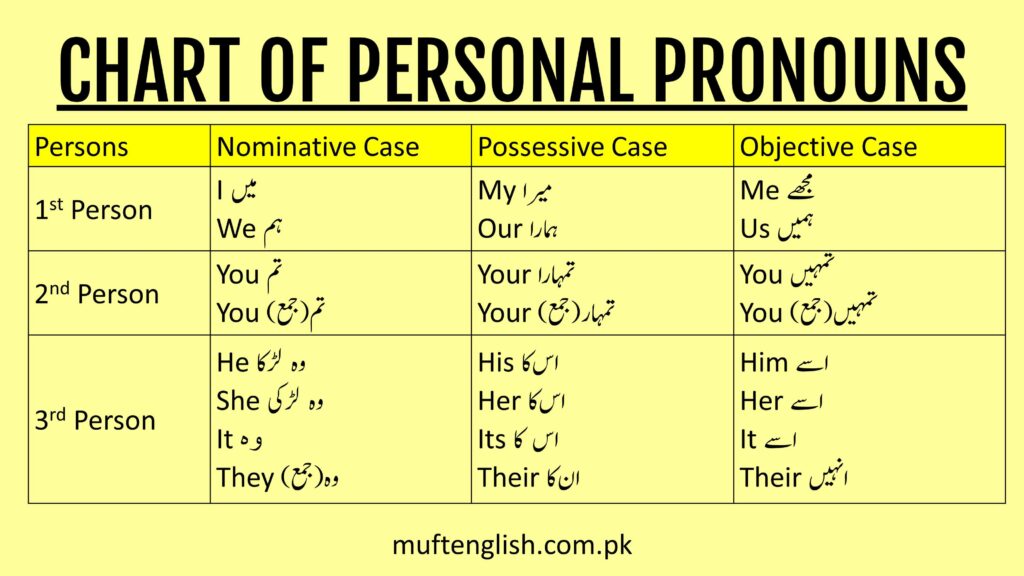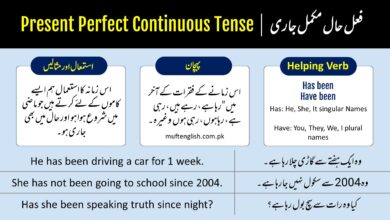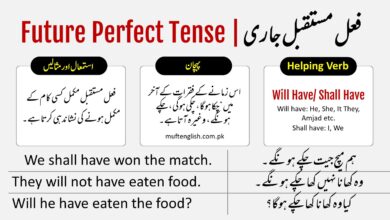Pronoun Definition and Their Types with Examples in Urdu and English

Pronouns and Its Types with Examples in English and Urdu
In this amazing blog, we are going to teach you all the types of pronouns with their examples and Urdu meanings. Below we have mentioned the nine types of pronouns with definitions and examples. Don’t forget to learn the chart of personal pronouns below.
Definition of Pronoun:
Pronouns are the words that we use in place of a noun.
وہ تمام الفاظ جوکسی اسم کی جگہ بولاجائےاسے اردو میں اسم ضمیرکہتےہیں۔
Examples:
| Nazia is a girl. | نازیہ ایک لڑکی ہے۔ |
| She is an intelligent girl. | وہ ایک محنتی لڑکی ہے۔ |
| Nadeem is a boy. | ندیم ایک لڑکا ہے۔ |
| He is good. | وہ اچھا ہے۔ |
In the above examples He and She are used instead of Nazia and Nadeem.
Note: we use pronouns instead of nouns when the listener or reader is already familiar with who we are talking about.
Kinds of Pronouns:
- Personal Pronouns
- Emphatic Pronouns
- Reflexive Pronouns
- Indefinite Pronouns
- Demonstrative Pronouns
- Possessive Pronouns
- Interrogative Pronouns
- Distributive Pronouns
- Relative Pronouns
Personal Pronouns: ضمائرشخصی
First Person:
There are three kinds of personal pronouns.
ضمائرشخصی کی تین قسمیں ہیں۔
I, My, Me and We, Our, Us are first persons of personal pronouns.
Examples:
| I read daily. | میں روز پڑھتا ہوں۔ |
| She helps me. | وہ میری مددکرتی ہے۔ |
| We read. | ہم پڑھتےہیں۔ |
| They beat us. | انہوں نے ہمیں مارا۔ |
Second Person:
The second person is the person spoken to.
جس شخص سے بات کی جائےاسےحاضریامخاطب کہتےہیں۔ مخاطب (حاضر) واحدبھی ہوتا ہےاورجمع بھی۔
You and Your, are second persons of personal pronouns.
Examples:
| You are a an intelligent boy. | تم ایک ذہین لڑکےہو۔ |
| You are teachers. | تم (جمع) استا ہو۔ |
| This is your car. | یہ تمھاری گاڑی ہے۔ |
| These are your pens. | یہ تمھاری قلمیں ہیں۔ |
Third Person:
The third person is the person whom we speak about.
جس کے متعلق کوئی بات کی جائے اسے غائب کہتے ہیں۔ یہ واحد بھی ہوتاہےاورجمع بھی۔
He, She, It, His, Her, Its, They, Their, and Them, are personal pronouns.
Examples:
| He is a boy. | وہ ایک لڑکا ہے۔ |
| She is intelligent. | وہ ذہین ہے۔ |
| It is a book. | یہ ایک کتاب ہے۔ |
| They are boys. | وہ لڑکے ہیں۔ |
| They are my brothers. | وہ میرے بھائی ہیں۔ |
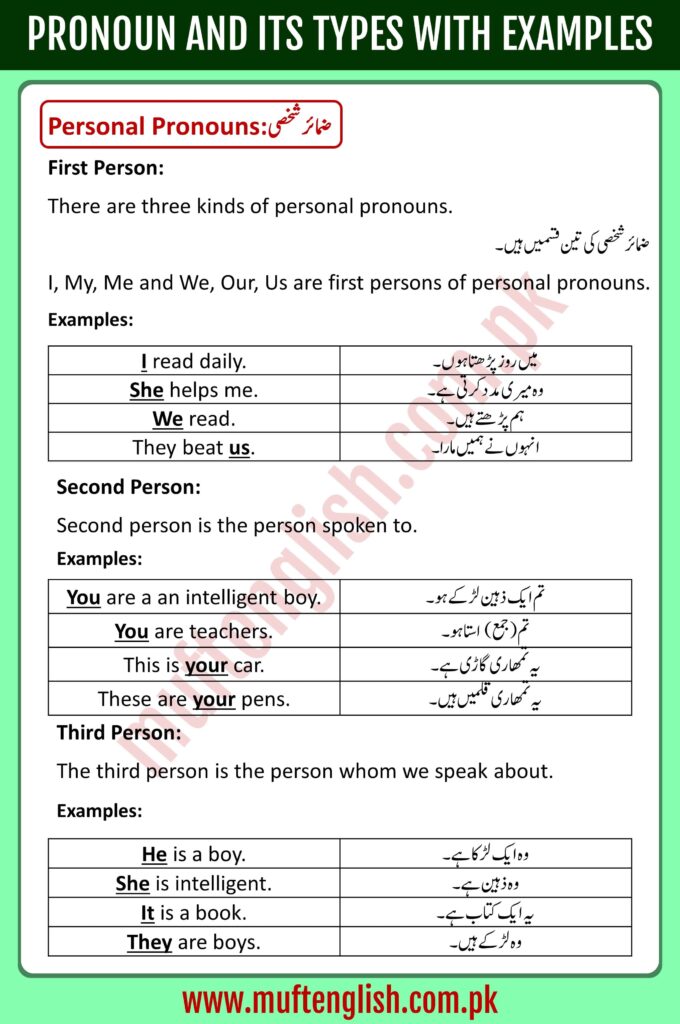
Chart of Personal Pronouns:
متکلم’ حاضر یا مخاطب اورغائب کی ضمیروں کی وضاحت نیچے چارٹ کوضروذہن نشیں کر لے۔
| Persons | Nominative Case | Possessive Case | Objective Case |
| 1st Person | I میں We ہم | My میرا Our ہمارا | Me مجھے Us ہمیں |
| 2nd Person | You تم You تم (جمع) | Your تمہارا Your تمہار (جمع) | You تمہیں You تمہیں (جمع) |
| 3rd Person | He وہ لڑکا She وہ لڑکی It وہ They وہ (جمع) | His اس کا Her اس کا Its اس کا Their ان کا | Him اسے Her اسے It اسے Their انہیں |
Emphatic Pronouns: ضمائر تاکیدی
These are called emphatic pronouns when they are used to emphasise.
جب ان الفاظ کوہم تاکید کے لئےاستعمال کرتےہیں تو یہ ضمائرتاکیدی کہلاتےہیں۔
Examples:
| He himself came here. | وہ خودیہاں آیا۔ |
| She herself goes there. | وہ خود وہاں جاتی ہے۔ |
| I myself saw her. | میں نے خود اسے دیکھا۔ |
| We saw the thief himself. | ہم نے خود چورکودیکھا۔ |
| You will do it yourself. | تم خودہی کروگے۔ |
Reflexive Pronouns: ضمائرراجع الی الفاعل
They are used when the subject and object of the sentences are the same.
جب فاعل اپنے آپ پرہی کام کریں توانہیں ضمائرراجع الی الفاعل کہتےہیں۔
Example:
| We taught ourselves to learn. | ہم نے اپنےآپ کو پڑھنا سکھایا۔ |
| I saw myself in the picture. | میں نےاپنےآپ کو تصویرمیں دیکھا۔ |
| She hurts herself. | اس نےاپنےآپ کوزخمی کرلیا۔ |
| You beat yourself. | اس نے اپنے آپ کو مارا۔ |
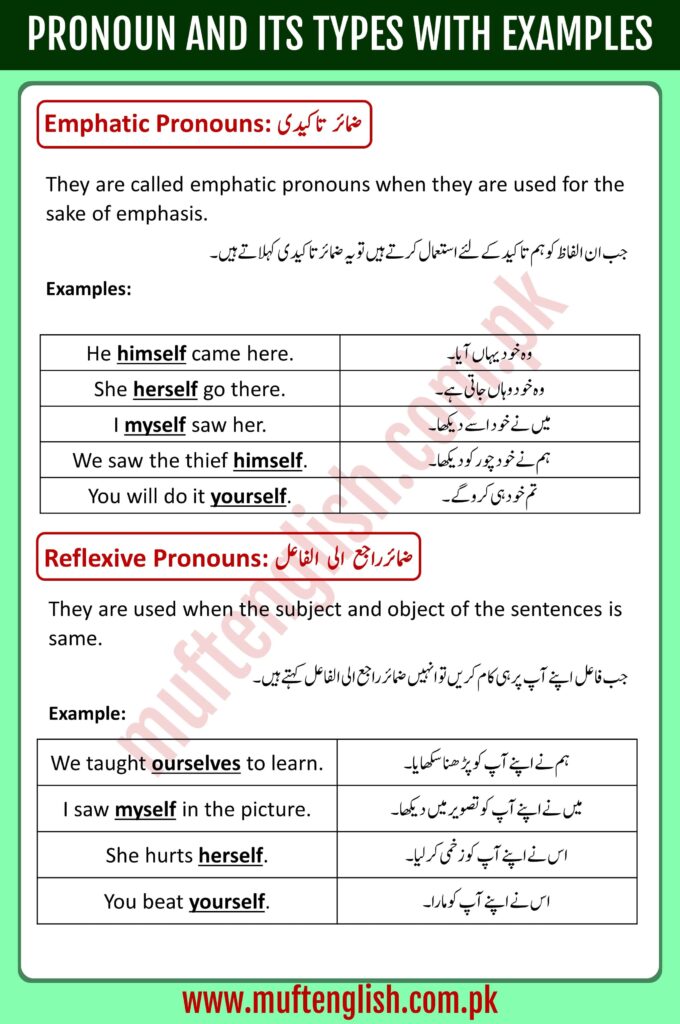
Indefinite Pronouns: ضمائرتنکیریہ
Indefinite pronouns refer to persons or things in a general way but do not refer to any person or thing in a particular way.
ضمائرجوعام چیزوں یا اشخاص کےلئےاستعمال ہوں ضمائرتنکیریہ کہلاتےہیں۔
Examples:
| Many of them are Pakistani. | ان میں سے بہت پاکستانی ہیں۔ |
| Few went there. | چند ایک وہاں گئے۔ |
| Do good to others. | دوسروں کے ساتھ اچھائی کرو۔ |
| All went there. | سب کے سب وہاں گئے۔ |
Demonstrative Pronouns: ضمائراشارہ
These are used to “point out”.
ایسےضمیرجوجوکسی چیزکی طرف اشارہ کریں ضمائراشارہ کہلاتےہیں۔
Examples:
| Those are books. | وہ کتابیں ہیں۔ |
| That is a book. | وہ ایک کتاب ہے۔ |
| This is a book. | یہ ایک کتاب ہے۔ |
| These are books. | یہ کتابیں ہیں۔ |
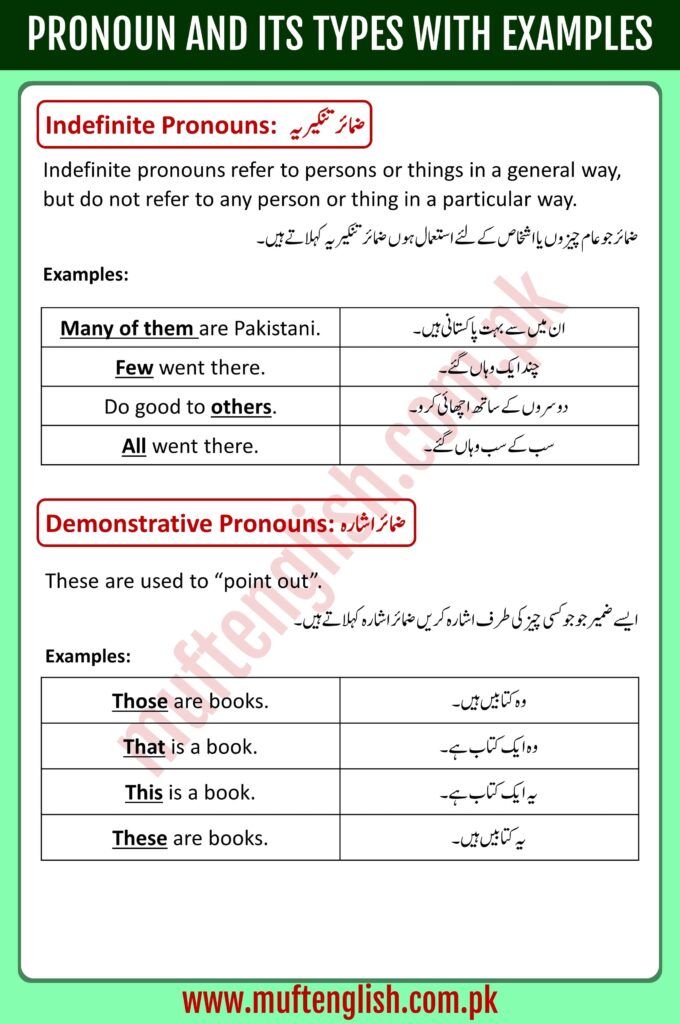
Possessive Pronouns: ضمائرملکیتی
Pronouns that show possession are called possessive pronouns.
ایسے ضمائرجوملکیت ظاہرکریں ضمائرملکیتی کہلاتےہیں۔
Examples:
| This pen is mine. | یہ قلم میراہے۔ |
| These cars are ours. | یہ گاڑیاں ہماری ہیں۔ |
| That book is yours. | وہ قلم تمہاراہے۔ |
| This phone is his. | یہ فون اس کا ہے۔ |
| That book is her. | وہ کتاب اس کی ہے۔ |
Interrogative Pronouns: ضمائراستفہامیہ
Interrogative pronouns are those pronouns used to ask questions.
ایسے ضمائرجوسوالات پوچھنےکےلئےاستعمال ہو ضمائراستفہامیہ کہلاتےہیں۔
Examples:
| Who broke this chair? | یہ کرسی کس نے توڑی ہے؟ |
| What is this? | یہ کیا ہے؟ |
| Whose car is this? | یہ گاڑی کس کی ہے؟ |
| What are you doing now? | تم ابھی کیا کررہےہو؟ |
| Which would you like? | آپ کونسا پسند کریں گے؟ |
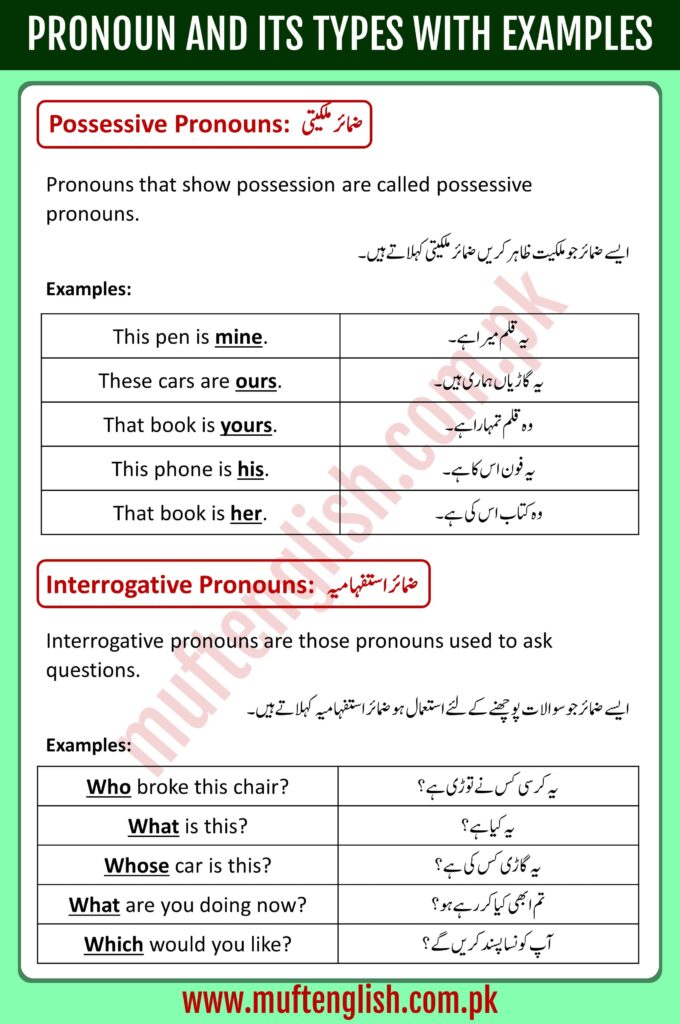
Distributive Pronouns: ضمائرتقسیمی
When pronouns refer to persons or things one at a time are called distributive pronouns.
ایسے ضمائرجوزیادہ اشخاص یا چیزوکوظاہرکریں لیکن ایک وقت میں واحدکےمعنی دیں ضمائرتقسیمی کہلاتےہیں۔
Examples:
| Either of these books are good. | ان کتابوں میں سے کوئی ایک اچھا ہے۔ |
| Neither of them were here. | ان میں سے کوئی بھی یہاں نہیں تھا۔ |
| Either of you can come in. | تم میں سے کوئی ایک اندر آسکتا ہے۔ |
| Each of the boys has a pen. | ہر ایک لڑکے کے پاس ایک قلم ہے۔ |
Relative Pronouns: ضمائرنسبتی
These are called relative pronouns when they refer to a noun that has gone before.
ایسے ضمائرجن کاتعلق ایسےاسم سے ہوجن کاذکرپہلےہوچکاہو۔
Examples:
| I know what they mean. | مجھے معلوم ہےان کےکہنےکاکیامطلب ہے۔ |
| This is the house that Amjad built. | یہ وہی مکان ہے جوامجدنےبنایاتھا۔ |
| I know the boy who is going. | میں اس لڑکے کو جانتاہوں جو جارہاہے۔ |
| This is the book that was on the table. | یہ وہی کتاب ہے جو میزپرپڑاتھا۔ |
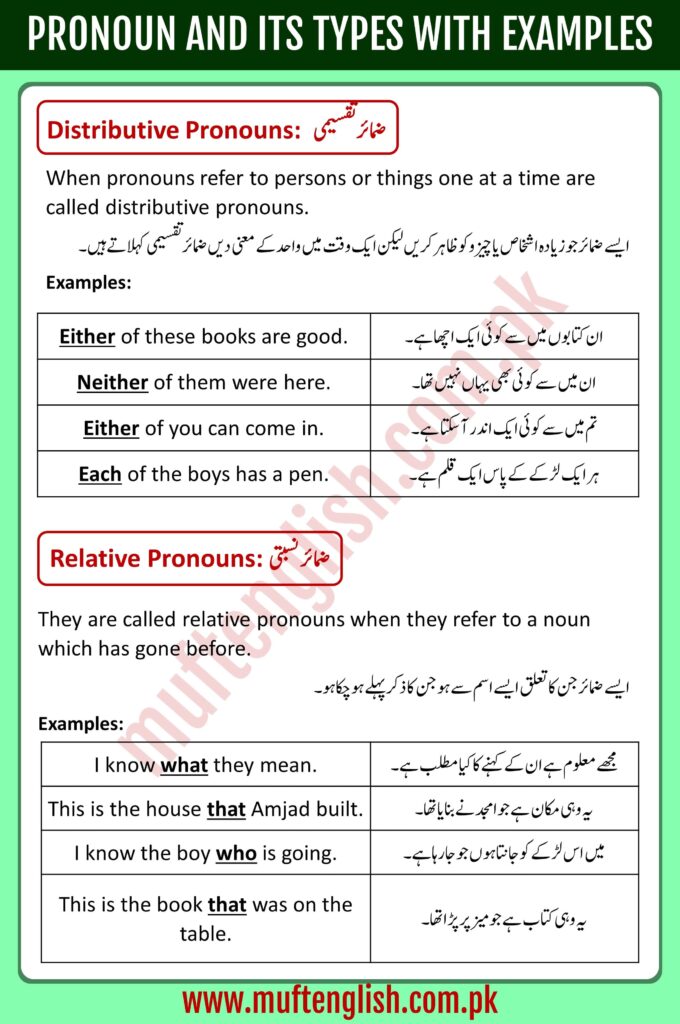
Pronouns and Their Types with Examples in English and Urdu PDF
I hope this lesson was helpful for you and you have learned all the types of pronouns with their types. If you want to improve your English grammar and you are preparing for any kind of competitive exams, you have to learn this blog, carefully. Get the PDF lesson below and start your learning journey.


